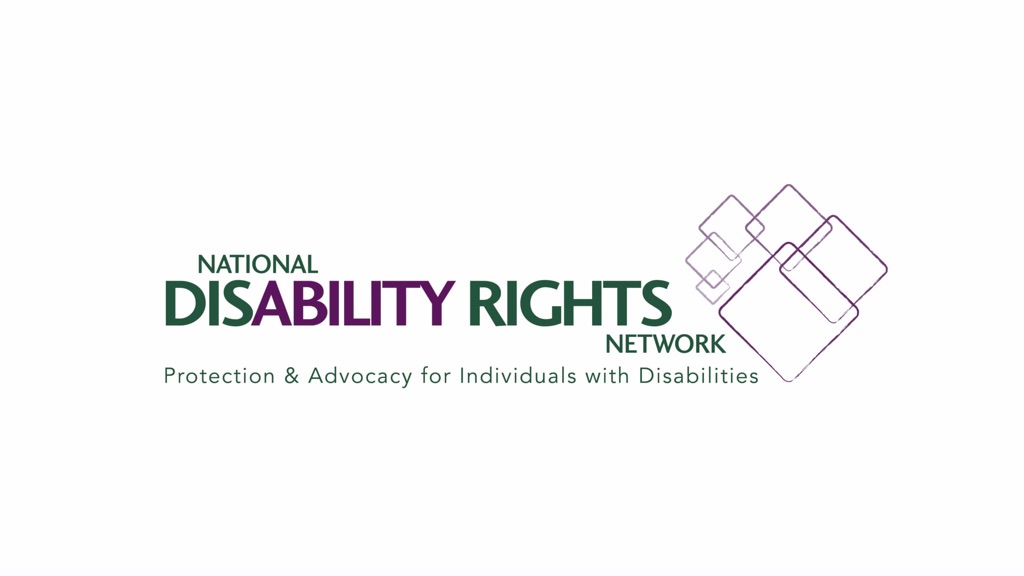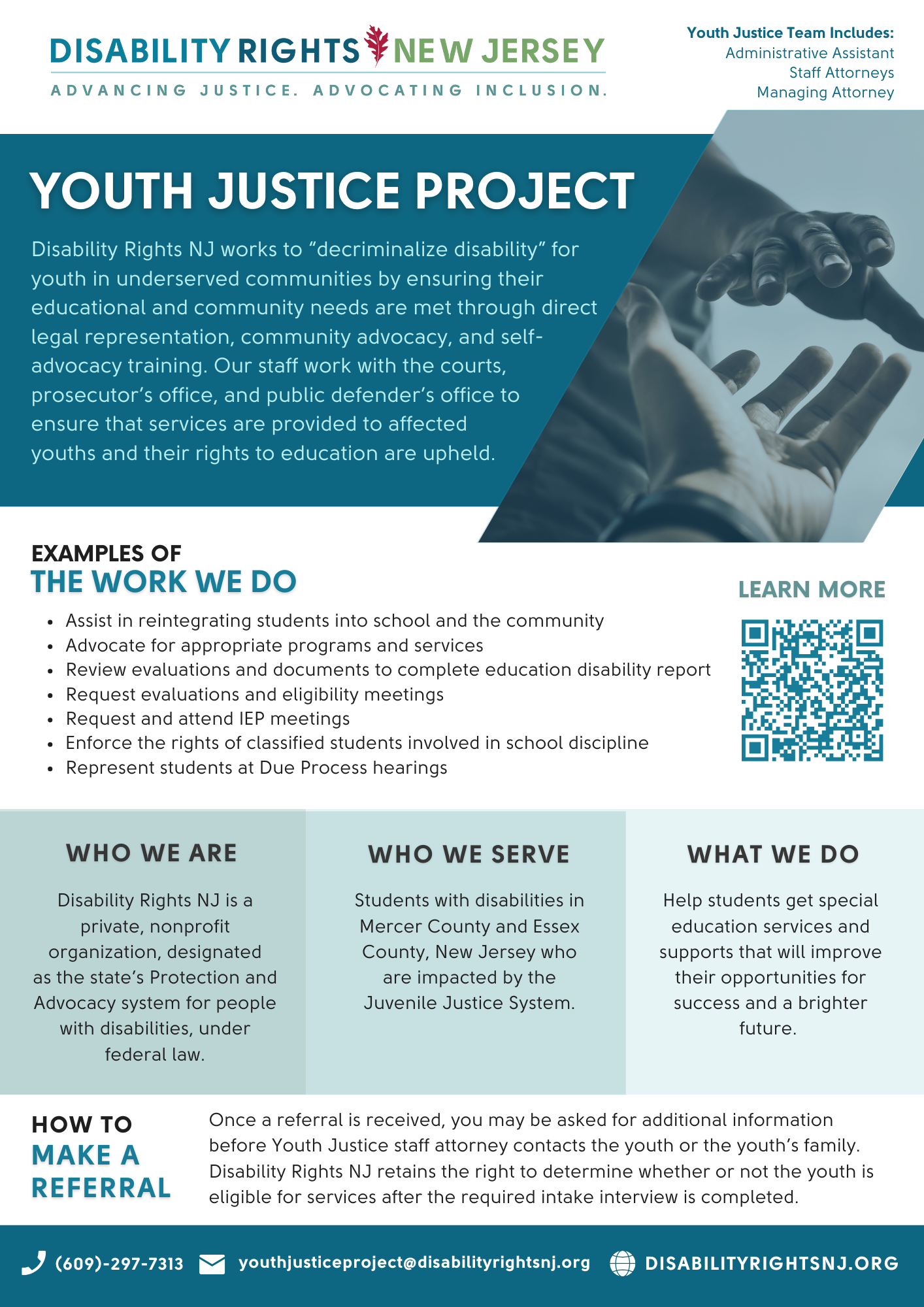Youth Justice
Through the inception of the Youth Justice Project, Disability Rights NJ attorneys on our youth-focused team share a deep commitment to fighting for justice and disability equality for the youth population of New Jerseyans with disabilities.
What is the Youth Justice Project?
The Youth Justice Project at Disability Rights NJ works to “decriminalize disability” for youth in underserved communities by ensuring their educational and community needs are met through direct legal representation, community advocacy, and self-advocacy training.
Modeled after similar projects in Protection and Advocacy agencies across the National Disability Rights Network, the Youth Justice Project has Memorandum of Understanding (MOU) with the Administrators of the Courts in New Jersey that allows Disability Rights NJ direct access to the court system and to justice-impacted youth in Mercer County and Essex County.
Our attorneys have a regular presence in juvenile court to provide information on disability and disability-related services. We also accept referrals from the public defenders, prosecutors, probation officers, and the Court to ensure students with disabilities get the appropriate services regardless of whether they are placed in detention, detention alternatives, or are going back home. Our advocacy includes a range of services from advice on how students and families can advocate for themselves, to full representation at due process hearings in certain circumstances. This project currently serves Mercer County and Essex County.
Disability Rights New Jersey Honored with NDRN Advocacy Award for Initiatives with Justice-Involved Youth and Youth with Disabilities in Residential Facilities

How We Help
Our justice-impacted clients with disabilities experience school exclusion, lack of academic and behavioral supports, and barriers to understanding and accessing community-based mental health services. By employing a multifaceted approach that combines legal advocacy, education, and support, the Youth Justice Project at Disability Rights NJ makes significant progress in overcoming the exclusion and lack of proper services for youth with disabilities in educational, court room, and community behavioral health settings.
At its inception, in the summer of 2020, Disability Rights NJ received seed funding from the Ford Foundation to establish the project with support from the Office of Public Defender in Mercer County. Currently, the Youth Justice Project relies almost exclusively on federal funding from our limited Protection and Advocacy grants. Our office regularly seeks and applies for other grants to cover the work of our attorneys and advocates in this space. The goal of the program, and the work of a Youth Justice Project Fellow, is to expand the number of youth served and expand the project to additional counties in New Jersey.
Understanding the Issue
Youth with disabilities, especially Black boys with disabilities, are most vulnerable to being propelled along the School-to-Prison Pipeline: disciplined more harshly, referred to law enforcement, subject to school-based arrest, and incarcerated. Over 13% of students with disabilities receive out-of-school suspension compared with 6% of students without disabilities. For Black male high school students with disabilities approximately one-third are subjected to school discipline. Moreover, students with disabilities represent a quarter of students arrested and referred to law enforcement.
The communities of our young clients are densely populated, segregated, small, urban environments with pockets of extreme poverty and high crime. Within those neighborhoods, there is a disproportionate number of black and brown youth living with disabilities, adverse childhood experiences, and traumas. The challenges youth face in the communities we serve include:
- economic disadvantages such as high poverty rates, low wage job opportunities, and a lack of affordable housing;
- personal safety, community violence, and consequences of crime issues;
- education disparities that include schools with inadequate resources, underperforming schools, and extreme rates of school exclusion;
- barriers to healthcare and behavioral health services;
- lack of appropriate treatment and support services in substance use;
- historical and systemic inequities such as racial discrimination, unequal access to resources, and social and economic disparities.
These issues can impact various aspects of well-being and increase the likelihood youth will be impacted by the justice system through the School-to-Prison Pipeline.
The School-to-Prison Pipeline
The higher rate of school discipline does not reflect a higher rate of misbehavior by students with disabilities, but reflects instead the impact of school policies, practices and leadership. Each suspension increases a child’s odds of becoming delinquent, abusing substances, getting involved with gangs, and getting caught up in the juvenile justice system.
Youth with disabilities are especially vulnerable to the impact of secure confinement, which can leave them traumatized and permanently damaged. The rate of suicide in juvenile justice facilities is approximately four times greater than in the general population. Moreover, juvenile incarceration greatly increases the likelihood of further involvement with the criminal justice system.
The large, prison-like juvenile correctional facilities in New Jersey should be closed. The majority of incarcerated juveniles, including the many with disabilities, should be held accountable while receiving developmentally appropriate programming and services in smaller facilities, closer to home and family support, that will prepare them for a productive adult life rather than a return-trip to criminal justice system.
Are you a law student interested in gaining practical experience advocating for justice-impacted youth?
Disability Rights NJ invites rising third-year law students and law clerks with a deep commitment to fighting for youth justice and disability equality to apply for a sponsorship opportunity to work with us as a public interest legal fellow.

